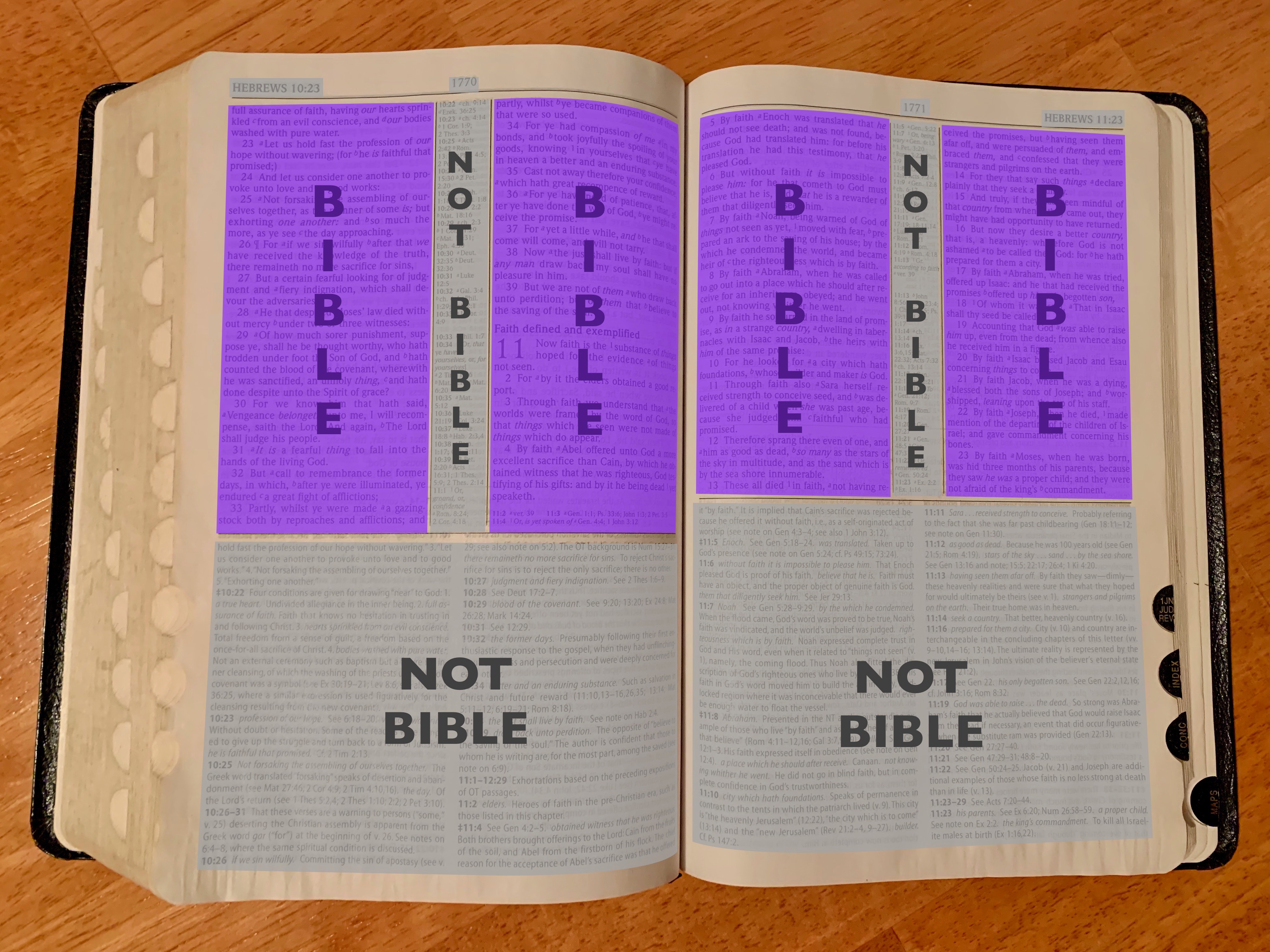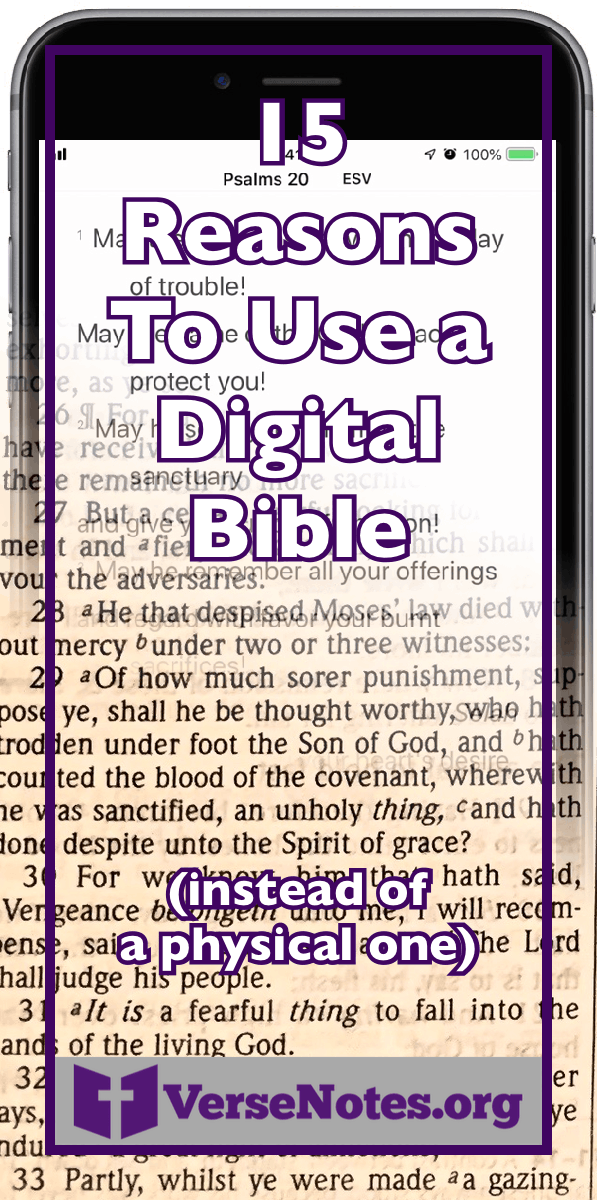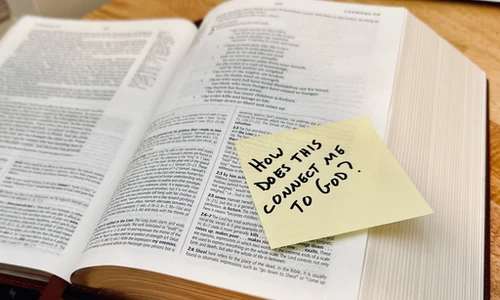This post is part of the series “Digital Bible vs Physical Bible”
-
15 Reasons to Use a Digital Bible Instead of a Physical Bible 👈 you are here
-
15 Reasons to Use a Physical Bible Instead of a Digital Bible
Every morning I wake up, ignore the alarm, wake up again, fix coffee and breakfast, and sit down to read my Bible. Most days, that’s actually what happens—I unlock my phone, tap the YouVersion Bible app, and start my reading plan. But some days, like today, for instance, my thumb finds Tweetbot instead. Or, worse, Mail. And down the rabbit hole I go.
Ten or fifteen minutes later, when I realize what I’m doing, I close the app, open up the Bible app, and wonder if I should switch from a digital Bible to a physical Bible for my daily devotional. After all, I have this gorgeous black Zondervan King James study Bible sitting back in the bedroom. I’ve been asking myself this question for years now, so I finally decided to sit down and have it out.
This post is a list of every reason I could think of to use a digital Bible instead of a physical one. Its companion post is a list of every reason I could think of to use a physical Bible instead of a digital one. Read both lists, and see which one is more convincing to you. At the end, I’ll tell you what I settled on.
Digital Bible Versus Physical Bible: Reasons to Choose a Digital BiblePermalink
1. A digital Bible is always with you.Permalink
My phone fits in my pocket, weighs less than a pound, and is always, always with me. That means that if I happen to rush out the door in the morning, and I have to do my devotional at lunch, I have it with me. My study Bible is bigger than some purses, weighs almost three pounds, and lives on my dresser when I’m not using it. And there’s no chance of my remembering to take it to work with me for a lunchtime read.
2. A digital Bible is easy to travel with.Permalink
I spend a lot of time on airplanes and in hotels for my job. When we’re lucky, my wife and I get to take nice vacations together. We both live a one-bag lifestyle when traveling, so size and weight capacity are important to us. That physical Bible takes up an awful lot of space, and I already told you how heavy it is. Even more, if we both bring one. But we’re going to have our phones anyway; the digital Bible weighs zero extra pounds and takes up zero extra space.
3. A digital Bible offers multiple translations.Permalink
Remember when I said my study Bible was a KJV, and you scoffed, knowing that obviously NIV/NASB/HCSB/ESV was a better translation? You’re not wrong! Different translations have different purposes, and I use several regularly, even during my devotional time. If one Bible is three pounds, imagine packing up a library of several.
4. A digital Bible offers multiple languages.Permalink
Speaking of size and weight, my interlinear Hebrew/Greek/English Bible is even bigger, and weighs a ridiculous five and a half pounds. On my phone, I just exit YouVersion and tap on Strong’s or Logos, and bam! The original languages are right there.
5. A digital Bible offers tons of other resources.Permalink
An interlinear Bible is one thing. What about a concordance? Bible dictionary? Maps? Commentaries? How many feet of shelving would it take to store just the free stuff from Logos? That’s not going to fit in my backpack. But it does fit in my pocket.
6. A digital Bible lets you search.Permalink
Quick, where does the Bible say, “Be holy, for I am holy?”
I can usually remember that Peter wrote it, and that it’s also in the Torah. But it would take several more minutes to pinpoint 1 Peter 1:16 and Leviticus 11:44. Except… with the Bible app, I just found both in under thirty seconds. (And a bonus: that phrase shows up in both Leviticus 11:44 and 11:45. And 19:2.)
7. A digital Bible lets you take infinite notes.Permalink
After I’ve found something cool like that—the place in Leviticus that Peter was quoting from—I like to make a note of it. Maybe I’ll highlight it, but more often I’ll open up Day One and jot down a few thoughts on the parallel and why it’s there and what it means. As of today, I have 816 notes like that, all of them searchable, sortable, arranged by date, and even geotagged so I can remember where I was when I had that thought. Regardless of how pretty your Bible art is, you’ll never match that capacity or recall.
8. A digital Bible helps you find books quickly.Permalink
If you grew up in a church, you might have had Bible races: someone would call out a verse, and the first person to find it in their Bible would get a prize. Maybe you always won, and you can turn to Nahum on the first try. I… cannot. I inevitably end up in Psalms, and I have to remember to turn left (Old Testament) or right (New Testament) to find the book I’m actually looking for. That’s assuming I can remember the spectacular New Testament mnemonic GEPCTTT, for the books between 2 Corinthians and Hebrews, or the order of the minor prophets. With a digital Bible, two taps, and I’m there.
9. A digital Bible makes it easy to share.Permalink
I hope you have a habit of sharing what you’re reading in the Bible. It’s important for us to make time to get in the Word and drink deeply, and it’s just as important for us to share the beauty we see. A quick highlight/copy/share gives you an instant ability to send a verse to a friend who needs it, or a group text where you can talk about it, or Twitter-Facebook-Instagram-Pinterest to share with a wider audience.
10. A digital Bible makes social networking easy.Permalink
As long as we’re talking about Twitter-Facebook-Instagram-Pinterest, YouVersion has its own social network built in where you can see what other people have said about the verse you’re reading. It even includes convenient image templates for famous verses, and a tool to make your own from a passage you love.
I suppose, now that I think about it, it’s just as easy to take a picture of your Bible and share it. I’m counting it anyway.
11. A digital Bible makes reading plans easy.Permalink
Many, many digital Bible reading plans exist. YouVersion has tons of them, and many apps offer their own, like She Reads Truth. You can, of course, follow a reading plan with a physical Bible, but finding each passage each day and keeping track requires more diligence than I have. My app reminds me every morning: Read this. It’s beautiful.
12. A digital Bible enables focus.Permalink
I know this sounds crazy, and backward—phones are supposed to be distracting—but bear with me. My study Bible has a ton of notes in it. It has those little references in the margins, and it has little commentary in footnotes, and it has translators’ notes so I can see where they made different decisions, and it has italic text for words not present in the original… frankly, it is a busy page. Which is awesome when I’m trying to dig deep. But a lot less awesome when I’m just trying to bathe in the Word and hear God speaking to me. A digital Bible has none of that: the Holy Spirit takes over the entire screen, and nothing else matters.

13. A digital Bible lets you listen to the Bible, not just read it.Permalink
Having the Bible in your ears, especially in a good speaker’s voice, can be a transformative experience. I’m usually pretty good at remembering what I read, but I don’t even have to try to remember what I’ve heard. Once, several years ago, I listened to the book of Micah, over and over and over again. To this day, when I read Micah, I always know what’s coming next, because I can hear that voice in my head: “But you, Bethlehem-Ephrathah, though you be little…”
14. A digital Bible can be read in bed, in the dark.Permalink
I told you I read the Bible every morning. But sometimes morning drags into midday, and sometimes I have a lunch meeting, and sometimes after dinner I watch an episode of Veronica Mars, and sometimes it’s 10:30 before I open my Bible for the first time. I don’t commend this practice—pick a time of day and feed that habit—but sometimes, it’s nice to relax in bed with all the lights off, illuminated by the glow of Scripture. (As a bonus, if you’re married, you won’t bother your spouse with a bedside lamp; they can sleep while you read.)
15. A digital Bible is free.Permalink
I know, phones are incredibly expensive these days. And my beloved iPhone is getting more costly every year. But if you already have it, getting another translation, or trying another app, is almost always free. Sure, unlocking every Logos resource could cost thousands of dollars; and some Bible apps cost a few bucks here and there; but the best digital Bibles are totally free, and nice physical Bibles don’t come cheap.
Which Kind of Bible Is Right for You?Permalink
That was honestly more than I expected. Even my notes for this article list only thirteen reasons; I had to go change the title before I published. So are you convinced? Digital Bibles clearly have a lot to offer.
But there’s something so compelling about opening up a heavy paper Bible day after day, year after year…. If you agree, I came up with 15 reasons a physical Bible is better than a digital one. Read those, and see if you like them better. Or let me know if I missed any reason you find convincing.
The Type of Bible I UsePermalink
I promised to share what I decided, and perhaps after this list, it’s obvious: I keep doing my daily devotional with a Bible app, YouVersion in particular, for exactly two reasons: my phone is always with me, and it tracks my reading plan for me. The other reasons are nice, but the convenience of not hauling my KJV back and forth, and not having to keep my place in a reading plan, mean I take my phone with me to the couch every morning. Oh, and despite my nice Bible being KJV, I make my digital one open to ESV. Some day, I’ll write about why.
Do you primarily use a digital Bible, or a paper one? I’d love to hear why you use what you use. And if you do use a digital one, I have a suggestion to enhance your understanding: read it sideways.

This post is part of the series “Digital Bible vs Physical Bible”
-
15 Reasons to Use a Digital Bible Instead of a Physical Bible 👈 you are here
-
15 Reasons to Use a Physical Bible Instead of a Digital Bible



